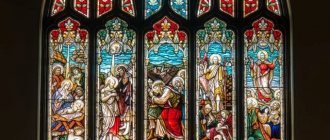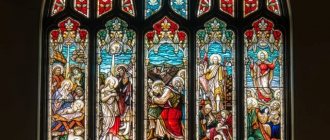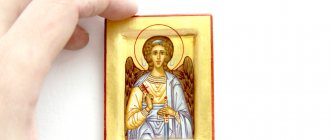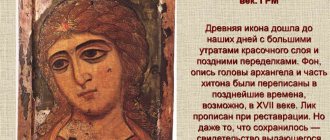Biography
The Apostle Paul did not communicate with Jesus Christ during his earthly life; he was not part of the Savior’s closest circle of disciples, nor was he one of the seventy preachers. The saint's biography contains dark spots and incomprehensible events. Paul was initially an ardent opponent of any teaching, a persecutor of followers of the faith, but the texts he wrote formed the basis of the foundation of New Testament theological thought, and the apostle himself turned into one of the most revered Christian saints.
Childhood and youth
Not every saint has a known date of birth. Paul is an exception in this regard, the only question is accuracy. Researchers have not come to a consensus: perhaps the apostle was born between 6 and 10 years of the first century, or in the 5th year. A very precise date is also given - May 25, 1977.
Apostle Paul
Paul's parents are Pharisees from Tarsus, the main city of the Cilicia region. From birth, the saint belonged to the elite of society, since he was not only born into a wealthy family, but also had the status of a citizen of Rome. Not every resident of the ancient powerful empire received such an honor. A Roman citizen had some privileges: he was not subject to corporal punishment and the shameful death penalty, he could not be put in chains without a court decision, and if a citizen did not agree with the decision of the local judge, he had the right to appeal to the court of Caesar.
At first the boy was named Saul, in honor of King Saul from the tribe of Benjamin, from whom his father traced his ancestry. It is believed that the family owned a textile or leather goods business, and Saul was taught the craft of making tents to earn a living.
Saul
Saul received his initial education at home. The father instilled in his son the veneration of the Torah and Pharisaic philosophy. The future apostle broadened his horizons at the school of the founder of Talmudic Judaism, Gamaliel, succeeded in Judaism more than other peers, and did not remain aloof from the emerging Christian movement. But, like all the Pharisees, he assumed that the expected Messiah would elevate the Jewish kingdom, and considered it wrong when the Savior turned out to be an unknown teacher from Nazareth, and, moreover, crucified on the cross.
Saul, possessing a lively mind and brilliant education, argued with Christians, but encountered a strong conviction in matters of faith, because of which he became embittered and considered the extermination of Christians to be pleasing to God.
"The Stone Stoneing of St. Stephen", Rembrandt
According to researchers of the apostle’s biography, Paul was a member of the Sanhedrin, the highest religious institution that performed the functions of a court. According to the New Testament, a similar institution imposed the death sentence on Jesus Christ. It is believed that it was while sitting in the Sanhedrin that Paul first encountered zealots of the Christian faith and began to persecute supporters of Christ.
The Acts of the Apostles says that Saul had the right to imprison and impose death sentences: “In all the synagogues I tortured them many times, and forced them to blaspheme Jesus.” For the first time, the name of Saul, the future apostle, was mentioned in the Bible in an episode associated with the execution of St. Stephen, the first Christian martyr. From the same “Acts” it is known that Stephen’s executioners laid their clothes at Saul’s feet and the future apostle “approved the murder.”
Prayers before the icon of the apostles Peter and Paul
O glorification of the apostles Peter and Paul, who gave up their souls for Christ and fertilized His pasture with your blood! Hear your children's prayers and sighs, now offered by your brokenhearted hearts. Because we are darkened by lawlessness and for this reason we are covered with troubles, like clouds, but with the oil of a good life we are greatly impoverished and we are not able to resist the predatory wolf who is boldly trying to plunder the heritage of God. O strength! Bear our infirmities, do not separate from us in spirit, so that we may not be separated in the end from the love of God, but protect us with your strong intercession, may the Lord have mercy on us all, for your prayers for the sake of your prayers, may He destroy the handwriting of our immeasurable sins and may He be honored with all the saints of the blessed The Kingdom and Marriage of His Lamb, to Him be honor and glory, and thanksgiving and worship, forever and ever. Amen.
( 3 ratings, average: 4.33 out of 5)
Christian service
The turning point in Saul's life was the Damascus events that occurred after the execution of Stephen. A member of the Sanhedrin was given the right to persecute Christians in Damascus. On the way to the city, Saul had a divine appearance - a pillar of fire and a voice calling him to apostolic service. The companions of the future apostle heard the voice, but did not see the light. Saul, stricken with blindness, was taken to Damascus, where he spent three days in prayer, repenting and asking for forgiveness. On the third day, the local Christian Ananias baptized Saul, and at the moment of the sacrament he received his sight.
Conversion of Saul on the Road to Damascus
It is not denied that the Lord overshadowed Saul with the Holy Spirit for a reason, but did it for the edification of those who doubted: if such a terrible person changed radically, having learned the will of God, then what can we say about the rest.
According to some theologians, the events near Damascus are clear evidence that Paul joined the teachings of Christ not through his disciples, since for an ardent persecutor of the followers of Jesus this is in principle impossible. In the situation with Paul, his conversion is truly God’s providence, the highest revelation. The book of Galatians states that
“Paul is an apostle, chosen not by men or through man, but by Jesus Christ and God the Father, who raised Him from the dead.”
Paul's conversion to Christianity enraged the Jews. The former persecutor for his faith hid in Jerusalem, where he met other apostles. Together with the Apostle Barnabas he went on his first journey, bringing the teachings of Christ to the people. Christians at first did not accept Paul's conversion because they remembered his past. It is believed that it was Barnabas, as well as the Apostle Peter, who helped the new convert become one of those whom he had recently so vehemently opposed.
Icons of the Apostle Paul
Faith in Christ left an imprint on Paul's entire subsequent life. He was reborn into a new man - an exemplary Christian who checked his actions, wherever he was, with Jesus Christ. The apostle spent 14 years on missionary trips, from the center of Asia to Rome, and even, according to legend, to the shores of the Atlantic Ocean in Spain and Britain. In 51, Saint Paul participated in the Apostolic Council in Jerusalem, where he spoke out against the need for pagans who converted to Christianity to observe the rites of the Law of Moses.
During the journey, Paul and Barnabas founded Christian communities in the cities of Iconium and Antioch of Pisidia, Athens and Corinth, Thessaloniki and Veria and other settlements. In the city of Lystra, the apostles healed a lame man. The inhabitants, having seen the miracle, proclaimed Paul and Barnabas gods and intended to make sacrifices to them, but the apostles managed to avoid the temptation to become equal to the Lord.
Temple of the Apostle Paul
On the contrary, the saints convinced the people that they were just mere mortals. At the same time, Paul received a faithful disciple, Timothy, and the Evangelist Luke joined them in Troas. The saint toured the Balkan Peninsula and Cyprus with sermons, where he converted proconsul Sergius to the faith.
The legend tells that the proconsul served the goddess Venus, but, being an intelligent man, became interested in the teachings that his guest professed. However, the local Jew Variisus, close to Sergius and considered a wizard, prevented this in every possible way. Paul stopped the sorcerer by showing a miracle - Variesus became blind. The amazed proconsul was baptized. From that moment on, in his travel notes, Luke called the apostle Paul.
“Holy Apostle Paul”, Andrei Rublev
It is assumed that the Christian convert offered protection to the apostle, which implied taking the name of the patron. However, John Chrysostom was of the opinion that Saul began to be called Paul after he was baptized by Saint Ananias. Evidence of this is the Jewish tradition of marking significant events in life by changing the name.
As follows from Holy Scripture, the Apostle Paul said that he was “entrusted with the gospel to the uncircumcised, as Peter was to the circumcised.” In other words, Peter, a native of Galilee who had difficulty learning foreign languages, preached among the Jews. Paul was faced with the task of bringing the Word of God to other nations living in the Mediterranean region and beyond.
The Apostle Paul writes the Epistle to the Corinthians
In his Second Letter to the Corinthians, the Apostle Paul described his ministry as one against the attacks of the Jews. Unlike the other apostles, St. Paul's previous experience allowed him to freely navigate the interpretation of the Torah, and therefore his sermons sounded more convincing and brighter, since he foresaw in advance what objections the Pharisees would raise. With a degree of probability, it is argued that Paul has a high self-esteem as a person who understands Christian issues better than others, who knows “how it should be done.”
When preaching among ordinary people, the apostle often used comparisons, believing that it was easier to convey his thoughts. Thus, sports competitions were held in Corinth, the winner of which received a laurel wreath.
Apostle Paul Preaching to the Ephesians
In his letter to the Corinthians, Paul compared receiving God's reward to a sports field on which is an incorruptible wreath—the crown of eternal life. But only those who pacify their desires and pride, who make efforts and live in self-discipline, like a winner in sports, will receive the reward.
“Strait is the gate that leads to life, and few find it...many are called, but few are chosen.”
St. Paul taught that man has three components—body, spirit, and soul. The body of any person is a temple in which a piece of the Holy Spirit lives. The human spirit is its immaterial part, in contact with the Highest Principle, a symbolic reflection of the Spirit of God. The soul is the main principle of life, encompassing the human mind, abilities and heart. At the same time, mind is not the usual understanding of intellect or reason, but also a manner, a tendency to think, a feeling, an opinion.
Apostle Paul
Paul used the terms “heart” and “conscience.” The first, in the understanding of the apostle, seems to be the center of a person’s inner life, where spiritual experiences are stored. Conscience acts as an internal judge and law, a moral measure of human actions.
Addressing the listeners of his sermons, the saint called on his fellow believers to leave the old store of knowledge and live according to new laws: not to prioritize personal concerns, to love sincerely, not to take revenge on those who persecute the faith, and to “turn away from evil.”
Where to hang and help the guardian angel icon
There are no prohibitions on placing a face at home. Usually it is hung in the corner of the room. It will be best if the image faces east. If this is not possible, then it’s okay. It would be better if you made a special cabinet with shelves for icons with glass, which will protect them from dust and various damages.
The best article for you, go to: What does the “Three Joys” icon help with?
This cabinet is called an icon case. There should be nothing nearby, because nothing should distract from prayer. Religious believers recommend hanging the faces of saints in every room. Don’t forget about the kitchen, because prayer while preparing food will sanctify the food.
Some people think it’s not right to hang the image in the bedroom. This opinion is erroneous, because marital intimacy is not a sin at all. It is advisable to pray before going out so that your guardian angel will protect you and help you in various matters. The Orthodox prayer to the guardian angel is pronounced precisely and clearly; thoughts, desires and requests should be formulated in advance.
Your guardian angel is with you from the moment of baptism. It not only prevents you from doing bad deeds and thoughts, but also records all your good deeds and deeds. He does this in order to present them before God's court. He is also the protector of soul and body. Those who are not baptized are under the control of demons. You can be baptized at any age, as long as it was not done in childhood.
God bless you!
In this video you will find out who the Guardian Angel is:
Death
According to legend, during Paul’s next trip to Jerusalem, the Jewish community set out to kill the apostle. The power of Rome saved the saint from reprisals, but Paul was imprisoned, where he spent two years. The local procurator did not act, and Paul petitioned Caesar for release.
Apostle Paul's head is cut off
According to the requirements of the judicial system, the Roman citizen was escorted to the Eternal City, where he lived for some time in relative freedom, but under surveillance. During this time, the apostle visited Malta, Ephesus, Macedonia, wrote Epistles to the Philippians, Palestinian Jews, Timothy and Titus, whom he ordained bishops.
Then Paul returned to Rome and preached at the court of Emperor Nero, for which he was again imprisoned. After 9 months of imprisonment, the apostle’s head was cut off. The monastery of Abbazia delle Tre Fontane is believed to stand on the site of the saint's execution. And at the burial site, the disciples of St. Paul left a sign, and two hundred years later, Emperor Constantine erected the papal cathedral of San Paolo fuori le Mura on this site.
The Christian Church has established the day of the holy supreme apostles Peter and Paul. In Orthodoxy, the holiday is celebrated on July 12, among Catholics - on June 29. On this day you should not do household chores - you should return from a church service to an already cleaned house. In prayers, Saints Paul and Peter are usually mentioned together; in front of the icon of Saint Paul, it is customary to ask for mental and physical healing, for the granting of strength in a charitable work and the conversion of those of little faith to Christ.
Prayer to the Holy Guardian Angel
Everyone needs prayer, because it is like a breath of clean air. There are prayers that you can read every day, but only once a year on your birthday. There are those that I read only in the morning, before going out or before going to bed. They are different so that everyone can find their own according to their needs and desires.
Every prayer has incredible power. The Guardian Angel hears all your requests and asks the Lord God for help for you. He not only does not leave us throughout life, but also does not leave us after death. In prayer you can repent of your sins, ask for protection, spend a day without evil, direct you on the path of salvation, and strengthen your faith. Ask for help from your soul so that it does not give in to temptation with these words:
“Holy Angel, standing before my accursed soul and my passionate life, do not leave me, a sinner, nor depart from me for my intemperance. Do not give room to the evil demon to possess me through the violence of this mortal body; strengthen my poor and thin hand and guide me on the path of salvation. To her, holy Angel of God, guardian and patron of my accursed soul and body, forgive me everything, I have offended you so greatly all the days of my life, and if I sinned this past night, cover me on this day, and save me from every opposite temptation May I not anger God in any sin, and pray to the Lord for me, that He may strengthen me in His passion, and show me worthy to be a servant of His goodness. Amen".
Memory
- 1080 – Capitular Church of Saints Peter and Paul (Prague)
- 1410 – Andrei Rublev, “The Apostle Paul”
- 1587-1592 – El Greco, “The Apostles Peter and Paul”
- 1619 – Diego Velazquez, “Saint Paul”
- 1629 – Rembrandt van Rijn, “The Apostle Paul in Prison”
- 1708 – St. Paul's Cathedral, London
- 1840 – St. Paul's Cathedral (Basilica di San Paolo fuori le Mura, Rome)
- 1845 – Church of the Holy Apostles Peter and Paul (Moscow)
- 1875 – Vasily Surikov, “The Apostle Paul explains the dogmas of faith to King Agrippa”
- 1887 – St. Paul's Church (Riga)








